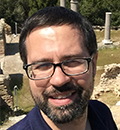Professore Associato
Dipartimento di Studi Umanistici
Settore Scientifico Disciplinare L-ANT/06 - ETRUSCOLOGIA E ANTICHITA ITALICHE
Insegnamenti Anno Accademico 2025/2026
- » ETRUSCOLOGIA (Magistrale Competenze Testuali - LM-14)
- » EDUCAZIONE AL PATRIMONIO CULTURALE (Magistrale Competenze Testuali - LM-14)
- » LINGUE E CULTURE DELL'ITALIA PRE-ROMANA (Magistrale Scienze Linguistiche - LM-39)
Tel. 0577240131
Email jacopo.tabolli@unistrasi.it
Studio Piano 1° - Stanza 120

Avvisi
Modalità esami
Gli esami della sessione Gennaio - Febbraio 2025 si svolgeranno in modalità esclusiva in presenza.
Modalità svolgimento lezioni
Lezioni in presenza - Venerdì Seminari al Museo Archeologico Nazionale di Siena - Da Maggio a Ottobre tirocini e laboratori di scavo al Bagno Grande di San Casciano dei Bagni
Orario di ricevimento: Per il primo semestre riceverò il martedì ore 10,30-11,30
Avvisi
Ricevimento il martedì dalle 9,00 alle 10,00 prima delle lezioni
Curriculum vitae Italiano
Jacopo Tabolli è Professore Associato di Civiltà dell'Italia Preromana ed Etruscologia (ARCH-01/C) presso l'Università per Stranieri di Siena. Ha conseguito la laurea triennale (2006) la laurea specialistica (2008), il dottorato di Ricerca (2012), e concluso un Post-Doc (2017) e insegnato presso la University of Cyprus a Nicosia e al Trinity College Dublin. Dal 2017 al 2021 è stato Funzionario Archeologo presso la Soprintendenza Archeologia, belle arti e paesaggio per le province di Siena, Grosseto e Arezzo. Ha all'attivo due monografie, la curatela di undici volumi e più di cento pubblicazioni in riviste, capitoli di volumi e atti di convegni. Editor di Officina Etruscologia e fondatore del Museo Archeologico Virtuale di Narce, da sempre si occupa di temi legati alla tutela dei beni culturali e all'economia della cultura, promuovendo spazi e modi di investimenti nella cultura.
Curriculum vitae Inglese
Jacopo Tabolli is Associate Professor Etruscology and Italic Archaeology at the Università per Stranieri di Siena. He received his BA in 2006, MA in 2008 and completed his PhD in 2012. Between 2015 and 2017 Jacopo has been a post-doctoral researcher at Trinity College Dublin, where he also taught for two years and Research Associate at the University of Cyprus. Until September 2021 he has been Archaeological Officer at the Soprintendenza Archeologia, belle arti e paesaggio per le province di Siena, Grosseto e Arezzo. He published two books, edited eleven volumes and wrote more than 100 papers on peer-reviewed journals and book chapters. Editor of Officina Etruscologia and founder of the Museo Archeologico Virtuale di Narce, his research interests include also cultural heritage law and economy of culture.
Linee di ricerca
The main research interests focus on Etruscan and pre-Roman material culture, funerary ideology, ancient political landscape and sanctuaries. Jacopo has been excavating in several necropolis, sanctuaries and settlements, thus combining the experience into a holistic approach to field archaeology.
He is the Scientific Coordinator of the Archaeological Exavation at San Casciano dei Bagni.
Jacopo has been working for many years on Etruscan Veii and the Ager Faliscus (especially on Narce), combining the study of material culture with archival research. He has addressing in particular the role of legal and illegal excavators at the time of the Unification of Italy (Francesco Mancinelli Scotti for instance - and is preparing a volume with M. Cristina Biella).
Jacopo is currently conducting research on the archaeology of the territory of ancient Chiusi, with a focus on the protourban and urban development of the centre, and on the territory to the west of the Cetona Mountain, towards the Ombrone Valley and the area of Etruscan Saina/Siena. He is also interested in the role of the small islands of Tuscany between the Late Bronze Age and the Romanization.
Jacopo welcomes applications for post-doctoral fellowships (especially Marie Sklodowska Curie Actions) to be hosted at UNISTRASI. If interested, please send your CV, an abstract of the proposal and a short letter of commitment to apply at jacopo.tabolli@unistrasi.it
Progetti
Jacopo over the last few years, alongside directing the excavation at San Casciano dei Bagni, has been coordinating several excavation projects in Tuscany, especially in the province of Siena (Chiusi, Pienza, Castiglione d'Orcia, Montalcino) and in the Isles of Giglio and Giannutri.
Jacopo currently directs the archaeological excavations at San Casciano dei Bagni (Etruscan and Roman sanctuary at Bagno Grande) and at Isola del Giglio (Seascape project), receiving funding from different National and International Institutions. Alongside the excavations, Jacopo is developing the display of the artifacts and contexts in local and national museums, integrating the results of field activities and surveys into broader projects of enhancing and communicating cultural heritage to local communities.
Pubblicazioni principali
Elenco completo da IRIS